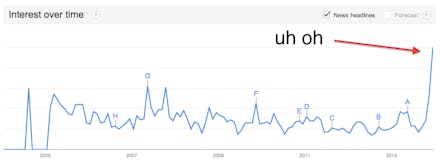Google Searches For "Stock Bubble" Are Record High — But Why?

The news: Stock market indicators aren’t the only thing surging: So are fears about our current economic growth.
As story after story about historic financial milestones makes the news, beleaguered Americans are increasingly wondering if our still-recovering economy is already growing a formidable new bubble. The proof? Google searches for "stock bubble" have suddenly hit an all-time high, as can be seen in this Google Trends chart.
As prescient Nobel Prize-winning economist Robert Schiller told Der Spiegel, “I am not yet sounding the alarm. But in many countries stock exchanges are at a high level and prices have risen sharply in property markets … That could end badly.” However, others have suggested that we’re seeing a bubble in the term "bubble," alone.
The background: It seems reasonable to be concerned about the 30% growth that the stock market has seen this year. The Dow Jones recently blew past 16,000 for the first time in history, the S&P crossed 1,800, and last week, the Nasdaq Composite exceeded the 4,000 mark for the first time in 13 years (i.e., since its long sad decline at the end of the dot-com boom).
That investment growth seems out of pace with relatively anemic real-world indicators, our uneven economic recovery, and the balance on most of our personal checking accounts. According to a U.S. Department of Labor report on Wednesday, productivity increased last quarter, but less than was expected. While Friday’s jobs report was strong, unemployment remains at over 7% for the general population, and well over 10% for young people, who are increasingly opting out of the workforce. And strong housing sales are unlikely to quell bubble fears, given our recent experience with the housing crisis.
Why you should care: It may seem like a cold comfort, but the good news is that the current bull market may be about to reverse itself.
Whether or not equities in general, and tech stocks in particular, are overvalued, prices are expected to drop in 2014 as soon as the Federal Reserve stops subsidizing banks by buying up bonds. The good news is that a market contraction would correct this year’s outsize growth and avert a future disaster. The bad news is that falling stock prices and reduced confidence may impinge upon the slower and more essential forms of growth on which our economic recovery depends.
As for fears over a bubble? Those aren't likely to abate any time soon. We're still on the rebound from our last relationship with economic optimism, and aren't really looking to spend time with a hot new market boom.